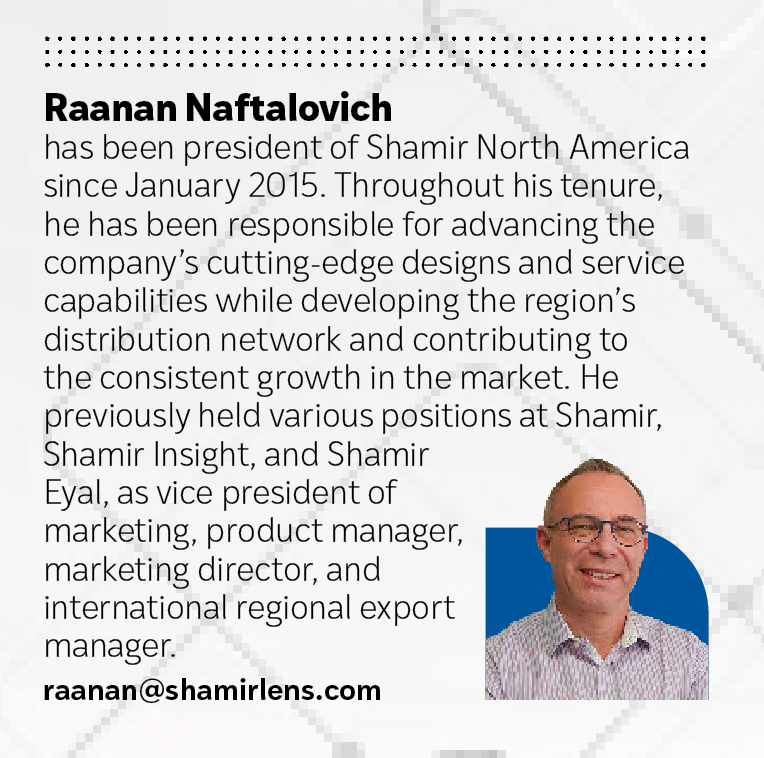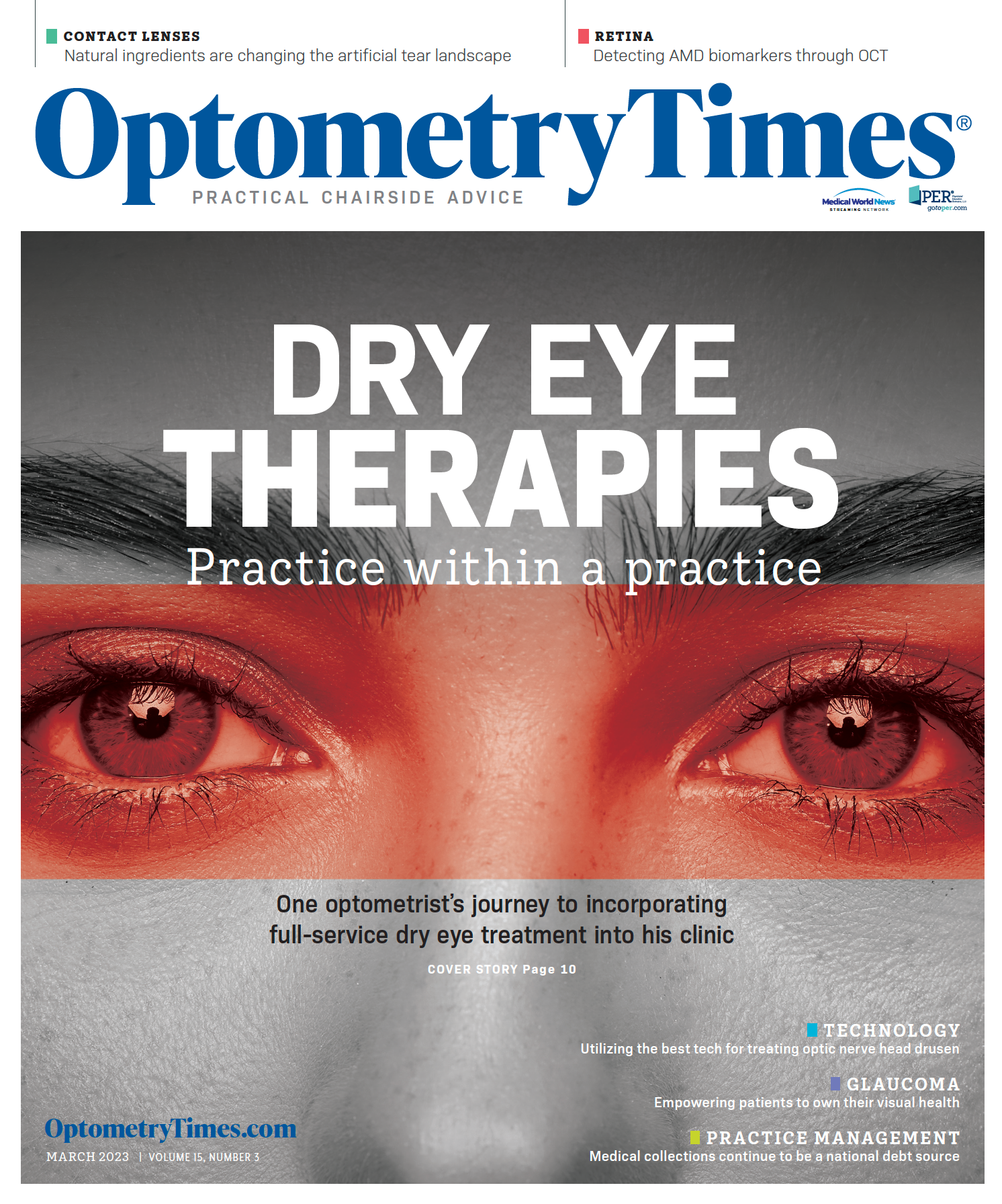Breaking into lens tech
Lessons learned during 30 years in the industry.

If you ask me, there is no more exciting, interesting, or dynamic industry than that of lens technology. Yes, you could say I’m biased—after all, I’ve spent my entire professional life within that space. I began at Shamir at the tender age of 18, naive, inexperienced, and hungry, but have had the great pleasure of working my way up and eventually becoming president of Shamir North America. And what a ride it’s been.
It seems as if every year we’ve had a front row seat to some of the most exciting innovations in lenses, coatings, materials, and more. And what’s even more satisfying is that with each new development, spurred on by our own and other groundbreaking developers, we’ve had the good fortune to change the lives of millions of customers around the world—helping people see better and live better.
So to all young entrepreneurs out there, itching to dive in and make waves in optical technology, I’d like to pass on some of the most important lessons I’ve learned, and perhaps help the next generation take the reins and push the industry even further.
Passion as a priority
Many entrepreneurs exude a passion for achievement, but in the optical field, that’s not just an advantage—it’s a requirement. To be successful in this business, you’ve got to have an unshakeable belief in what you are doing and who you are doing it for. You should never see your work as a job, but rather as a calling. And that spirit should permeate every aspect of your work, from the way you treat your employees, to the tenacity you display when fostering partnerships, even in the way you view research
and development.
Every piece of your company needs to have a healthy degree of passion, and this will propel you forward, through good times and bad. It will also drive your team to look for innovative solutions to seemingly insurmountable problems. If your company faces financial difficulties due to unexpected changes in the market, your passion will be the wind in your sails that pushes you forward. And in the long run, a day spent doing something you love is a day well spent.
Service is key
It’s easy to forget sometimes, but the optical industry is a service industry. While it may not be the first thought that pops into your head, such as the healthcare industry, we can assure you that when you take a closer look, our business is built upon relationships.

I firmly believe that relationships are the backbone of what we do and in unexpected ways. We should always treat suppliers, vendors, clients, partners, and customers with respect and kindness, always. In the quest for excellence, we may become bogged down by the minutiae and be tempted to forget that humanity is all around us. The difference between true innovators and the rest is that the former understand the importance of maintaining positive relationships and know the importance of impeccable service. Hold on to that, and you will be rewarded tenfold.
A commitment to service also guides our path in terms of research, ideation, and production. Making consumers’ lives easier is our goal. When we focus on serving their needs, we find the answers to their most pressing problems.
Always be agile
One of the tenets I’ve adopted during my time at Shamir is the importance of an agile mindset. Flexibility is paramount in any field, but in the optical industry, it’s indispensable. Every year we’re faced with a plethora of technological breakthroughs, revolutionary techniques, and newly discovered treatments that change the way we see eye care.
To respond to this ever-evolving landscape, optical executives must always be ready to receive new information, adapt to changes in the way we work, and let go of preconceived beliefs that most people adhere to. All of which require an agile mindset. So the next time your organization is faced with a disruptive discovery, you should verify its efficacy, then accept and adopt it.
Never stop learning, never stop improving
A degree of humility is essential to remaining successful in the eye care industry. No matter how far you succeed, remember to ground yourself and your team. What is superior technology one year may be obsolete the next. But if you stay humble, you won’t rest on your laurels; instead, you’ll be driven to push the envelope and strive for excellence.
The same applies when it comes to delivering personal service. Just because you’ve built a good reputation doesn’t mean you can sit still. Reputations are built on continuous, day-to-day dependability. And that means answering every complaint, correcting every error, and constantly performing quality control on your products and services.

The truth is that lens developers are never done learning. That’s because, as I’ve already mentioned countless times (and that should tell you something), our industry is always advancing. Whenever you think you understand a particular methodology or treatment, a new one comes along. Therefore, all of us need to stay abreast of the latest breakthroughs, read the most recent research, and attend the most important conferences—in short, stay fully involved and fully informed.
Embrace artificial intelligence
One of the biggest innovations in the eye care industry is artificial intelligence (AI). Its developments have allowed eye care professionals to deliver better care, more precise diagnoses, and improved outcomes. AI technology is a welcome addition to lens development, especially when it comes to clinical research. Through AI, investigators studying advanced age-related macular degeneration can process patient imaging in a significantly faster way than ever before. It is advancements like these that show us the way forward. As an up-and-coming member of the lens industry, you’ll want to welcome AI with open arms.
These are some of the lessons I’ve learned during my career, and I hope they serve you well in your journey in the optical industry. There may come a time (or two) when you doubt your efforts, your direction, and your future. Make sure to stick to your core principles, no matter what. When we fall into the trap of self-doubt, you must stay the course and keep heading towards your goals with relentless passion.
That’s what I’ve done, anyway, and it’s worked wonders.

Newsletter
Want more insights like this? Subscribe to Optometry Times and get clinical pearls and practice tips delivered straight to your inbox.